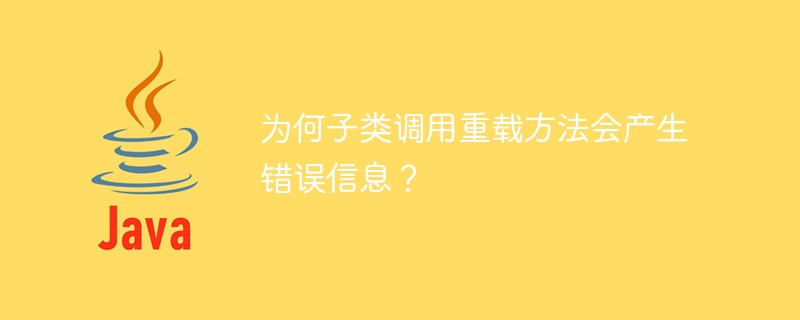Home >Java >javaTutorial >Why does a subclass generate an error message when calling an overloaded method?
Why does a subclass generate an error message when calling an overloaded method?
- PHPzOriginal
- 2024-03-08 11:15:03591browse

Why does a subclass generate an error message when calling an overloaded method?
In object-oriented programming, overloading is a technique of defining multiple methods with the same name in the same class. When calling an overloaded method, the compiler will determine the specific method to be called based on the method's parameter type, number, or order. However, when a subclass inherits an overloaded method defined in a parent class, some error messages may appear. Why is this? Let's explain this with a concrete code example.
Suppose there is an overloaded method defined in a parent class Parent public void print(int a) and public void print(String s), subclass Child inherits the parent class and tries to call these two overloaded methods. Let's take a look at the following sample code:
public class Parent {
public void print(int a) {
System.out.println("Printing integer: " + a);
}
public void print(String s) {
System.out.println("Printing string: " + s);
}
}
public class Child extends Parent {
public static void main(String[] args) {
Child child = new Child();
child.print(10); // 调用父类的重载方法 print(int a)
child.print("Hello"); // 调用父类的重载方法 print(String s)
}
}In the above code, the subclass Child calls the overloads in the parent class Parent after instantiation. Method, this example is no problem, we successfully call both overloaded methods and output the correct results. However, when a method with the same name is overridden in a subclass, an error message may be generated. Let's look at the following example:
public class Child extends Parent {
public void print(double d) {
System.out.println("Printing double: " + d);
}
public static void main(String[] args) {
Child child = new Child();
child.print(10); // Error: The method print(int) is ambiguous for the type Child
child.print("Hello"); // 调用父类的重载方法 print(String s)
child.print(10.5); // 调用子类的重载方法 print(double d)
}
}In this example, the subclass Child inherits the overloaded method of the parent class and adds a new overloaded methodpublic void print(double d). When we try to call child.print(10), the compiler will display an error message: The method print(int) is ambiguous for the type Child. This is because the compiler cannot determine that the method of the parent class should be called. print(int a) is still the subclass’s print(double d).
In order to solve this problem, we can explicitly specify the method to be called, or avoid overloading the existing methods of the parent class in the subclass. When a method in a subclass conflicts with a method in the parent class, the compiler will be unable to determine which method to call, thus generating an error message.
In object-oriented programming, it is very important to understand the concepts of overloading and inheritance. Only by fully understanding these features can we write more robust and clear code.
The above is the detailed content of Why does a subclass generate an error message when calling an overloaded method?. For more information, please follow other related articles on the PHP Chinese website!

